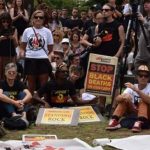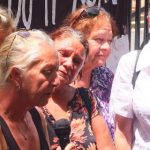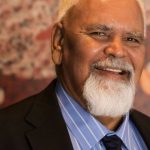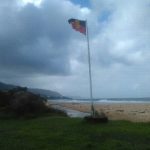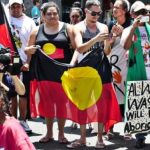Keep Adani Out: An Interview with Wangan and Jagalingou Council’s Murrawah Johnson
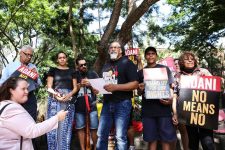
The Adani Carmichael coal mine is a $22 billion dollar project that, if approved, will be built in the Galilee Basin, Queensland. If the Indian multinational manages to get approval, the mine will be the biggest in Australia, comprised of six open-cut pits and five underground mines.
Of course, a mine of this magnitude will only bring benefits to a world that’s already suffering grave environmental devastation.
Twenty thousand hectares of bushland will be felled, the Great Barrier Reef will become a shipping highway and the carbon emissions produced will further submerge island nations like Kiribati below the sea.
Traditional owners aren’t keen
The Wangan and Jagalingou people are the traditional owners of the land earmarked for the mine, and unsurprisingly, they’re very unimpressed that a mining company is proposing the destruction of the land they hold custodianship over, as well as the poisoning of their waterways.
Adani approached the Wangan and Jagalingou people in 2012 to try and negotiate an Indigenous land use agreement (ILUA) over the area of the proposed mine under the provisions of section 31 of the 1993 Native Title Act. But the local people voted against the idea.
The Indian multinational repeated the same approach in 2014, but to no avail. However, then in early 2016, Adani took a very different approach, they invited a few hundred Indigenous people who weren’t local traditional owners, paid them off and got them to vote in favour of the mine.
Majority rules, so says the Federal Court
In 2016, when the Adani ILUA was put up for the vote seven out of twelve claimants voted in favour of the agreement, which meant it was legally binding.
This was due to a precedent set by a 2010 Federal Court ruling known as the Bygrave decision, which found that only a majority of native title claimants had to sign an ILUA.
Consensus has always been the Indigenous way
However, on February 2, the Federal Court ruled that the largest native title settlement in Australian history was invalid.
The Noongar native title settlement was worth $1.3 billion dollars and involved traditional owners surrendering their native title rights over an area of 200,000 square kilometres of southwestern Western Australia.
The court found that under section 24CA of the 1993 Native Title Act, four of the ILUAs were invalid, as not all claimants had signed them. Referred to now as the McGlade decision, it’s set a new precedent whereby all native title claimants have to sign an ILUA in order for it to be legally binding.
The federal government in panic mode
Australian attorney-general George Brandis rushed the Native Title Amendment (Indigenous Land Use Agreements) Bill 2017 through the House of Representatives on February 16 to amend native title laws. If passed by the Senate, it will reverse the impact of the McGlade decision back to that of Bygrave.
An unfazed Indigenous activist
Murrawah Johnson is a 22-year-old Wangan and Jagalingou activist. Although, she finds the actions of the federal government’s act of rushing through the native title amendment bill deplorable, she doesn’t think it will have too much of an impact on the decisions surrounding the Carmichael mine, as her people have about four court cases pending on the issue.
Sydney Criminal Lawyers® spoke with Murrawah Johnson, youth spokesperson for the Wangan and Jagalingou Traditional Owners Council about the impact of the pending native title amendments, the fiasco surrounding the Adani Indigenous land use agreement and the continuing fight of the traditional owners.
What would the Adani Carmichael coal mine mean to Wangan and Jagalingou people: to your land and to your culture?
So to the Wangan and Jagalingou people, the go ahead of the Adani Carmichael coal mine would effectively mean annihilation, if not, the complete destruction of our people. Because we know that the mine is going to affect our water, and poison our sacred water source.
And then how can the people go on to live from there if the water is poisoned.
And so, the Adani Carmichael coal mine is supposed to be one of the largest industrial projects in the world. The largest new open-cut coal mine in the history of the southern hemisphere.
On scale, and when built, it would be the third largest coalmine in the world: 40 kilometres by 13 kilometres, and just 10 kilometres away from our sacred natural springs.
And each spring feeds up from the Great Artesian Basin and the water table is just 400 metres down. And this proposed mine site is smack bang on top of the Carmichael River.
There’s no way that they can say that they’re avoiding contaminating the water and poisoning it. But also, we know they probably want to use the water from the river as well.
So it’s sucking the life force out of the country essentially.
Our Dreaming started with water, started with rain. The Rainbow Serpent: it’s our journey to protect the water. It’s sacred. And to agree to the Carmichael coal mine would be 100 percent inconsistent with our responsibility as the caretakers of that country.
At the beginning of last month the Federal court ruled that the Noongar native title settlement was invalid because not all claimants had signed it? Now known as the McGlade decision, what did you think about the outcome and the implications of this case?
At the moment, we have a situation where the Wangan and Jagalingou said no to an ILUA with Adani on three occasions. The first one in 2012, the second time in 2014, and the third time in March last year.
Since then Adani bought off 210 people, who’ve never previously identified as Wangan and Jagalingou, nor participated in the claim group, to show up to a meeting and vote on an agreement that doesn’t even affect them, or the future of their native title interest of their country – because it’s our country right.
So from this meeting, Adani were able to buy off a whole bunch of people and pay them $700 each to show up and put their hand up. Adani then went ahead and said that they have a purported ILUA with the Wangan and Jagalingou people.
They put that ILUA in for registration with the National Native Title Tribunal. We’re challenging that registration of that Indigenous land use agreement on many grounds – including the fact that they’re not Wangan and Jagalingou people who made that decision.
And of course, now that McGlade has happened, Adani doesn’t have what it needs for its Indigenous land use agreement to even be eligible for consideration to be registered as ILUA.
So the ILUA that Adani put together with the people they paid off was going to be registered on February 10. But then the National Native Title Tribunal put a moratorium on new ILUAs. So is that still happening? Is that registration process still on hold?
At the moment yes, and there is the Senate inquiry running as well. What happened was the McGlade decision happened. Adani’s agreement was going to be passed but they had to effectively go and kill it, because they had seven signatures and McGlade ruled that they needed twelve. They need all claimants to sign off.
Then there was created this notion of urgency. That there’s a crisis. And that’s that Aboriginal people don’t have to abide by the earlier Bygrave Federal Court decision. So then there’s going to be an economic crisis, if not recession across Australia, because ILUAs won’t be able to be registered.
Right at the moment, they’re saying around 157 ILUAs. But there’s no evidence that the McGlade decision affects any ILUA except the Adani purported ILUA.
That was going to be one of my next questions. So the government is rushing through the native title law amendment bill. And they’re saying there’s between 120 up to 200 ILUAs from the past that could be affected. But do you think that’s the case, or do you just think that it’s actually the Adani issue that’s pushing through this legislation?
One hundred percent. The pushing and the lobbying of the Queensland Resources Council, the Mining Lobby, the Liberal federal ministers in Queensland, and the attorney-general’s office, want to undermine the McGlade decision – which is the decision of the full bench of the Federal Court of Australia. They want to undermine that immediately through introducing legislation that would undo the McGlade decision, and they’re hoping this will keep the Adani ILUA alive.
So they’re about to come back with the announcement from the Senate committee on the native title amendments. What do you think’s going to happen if they do reverse the outcome, and revert things back to the Bygrave decision?
We’ve got a lot of legal cases running. So McGlade is just one aspect that catalyses, as we could just go and seek a declaration from the Federal Court saying, “This ILUA that was set up for registration doesn’t have what it needs, under the current law at this minute.”
Obviously, the amendment that they’re trying to put through, isn’t all just about Adani.
The Adani ILUA being dead after the McGlade decision, I think, was the trigger moment to preserve and increase the grip of the Bygrave decision and what it did to the Native Title Act, as it effectively legislates divide and conquer tactics.
What the repercussions are if the amendments do get up, it doesn’t mean that the Adani ILUA is safe, because we have other legal actions running. And McGlade is just one of aspect of it.
What I will also say is that we asked for the evidence, where this will affect the ILUAs. And it’s not some sort of automatic immediate invalidation of these hundreds of ILUAs that they’re talking about.
People have to go and take action on that. You know, take out a court action based on the law at the moment which is McGlade. So it’s very complicated.
But I guess what’s happening, and I think it’s reflected by the fact that the National Native Title Tribunal were due to make a decision on February 10 – eight days after McGlade happened – about the registration of Adani’s ILUA.
Adani had to fight for the registration. We objected to that registration. That is one of the litigations that we’re running. And so notice that the day the National Native Title Tribunal was due to make a decision about the Adani ILUA registration the tribunal decided to put a moratorium about making decisions about ILUAs that may be affected.
So effectively, they’re saying, “We’re going to put everything on hold until they change the law. And then, when the law goes back to the way we want it, which is Bygrave-on-steroids/majority-rules-on-steroids – and with no protection for the claim group, then once the law has changed, then we’ll go ahead and undo the moratorium and continue with business as usual, which is despite Aboriginal people saying no and not giving consent to allow the state to issue mining leases giving them native title approval.”
That’s effectively the function of the National Native Title Tribunal at the moment. Because if the Native Title Tribunal had come to a decision that they weren’t going to be registering the Adani ILUA on that day then they could have still made that decision.
The fact that they didn’t means that McGlade affected it, which means that they may have been planning to register the ILUA. But McGlade obviously means that the ILUA is not valid and just doesn’t even meet the mark or the grade to be registered.
And the fact that they were saying that they were putting that moratorium on because of all the ILUAs in the past, again you’re saying that is an invalid statement and basically, they called the halt on considerations of ILUAs specifically for the Adani agreement.
That’s what I believe, because again there’s no evidence that there are any other ILUAs that were affected. Especially, that’s the one that was due to be made the week after the McGlade decision was made.
And so, what I was also going to ask is that the Queensland government issued a mining lease for Adani on the Carmichael mine on August 19 last year. Given that the ILUA hadn’t been registered, and still isn’t. How does the government go about issuing such a lease, when they don’t have that native title agreement?
So this goes a long way back. I think it might have been April 3 that minister Lynham decided he was going to be issuing the mining leases, so maybe they didn’t come into effect until August 19, but I know that April 3 was the day that the decision was made. So I’m not sure if it came into effect immediately or if it was after the fact.
But so in 2014 the Wangan and Jagalingou said no to Adani. There were two members of the then three part applicants that wanted Adani to go ahead, even after instructed by the families within the claim group to object to the Adani compulsory acquisition application that they launched in 2014 to the National Native Title Tribunal.
Even after the applicants were instructed to object on our behalf to the compulsory acquisition, two out of three of those people said we’re not going to object and so what happened was under Bygrave they constituted the majority of the applicants. So the objection wasn’t formally accepted – this is what the court is arguing and also what the state government is arguing.
My uncle Adrian Burragubba, he said, “I am an applicant. I have a job to do. I agreed to these terms and conditions. And the claim group want me to object to this compulsory acquisition.”
So he then made a statement of claim to the National Native Title Tribunal, but it was the other two members of the applicants, who then constituted the majority. One of the native title lawyers said to the tribunal at the time, “Oh, there’s no need to listen to that statement of claim.” Obviously, because they were trying to undermine the decision of the claim group.
But what happened was the Native Title Tribunal said that it was in the public interest because Adani had said so. And when we’re talking about the act being done, we’re talking about two things. One was that of the then federal environmental minister’s approval and the other part was native title approval.
And this is when the Native Title Tribunal comes into it. Because when the people say no, the Native Title Tribunal can go ahead and say, “It’s in the public interest we believe, because of the money, etc. And we’ll say yes.”
And then the Native Title Tribunal overrides the decision of the claim group and therefore gives the state government the two approvals that it needs for them to be able to issue mining leases.
So what happened was a decision was made, which was perhaps August 19, when the tribunal said, “The act maybe done.” Which means the issuing of the leases maybe done.
And the challenge to that was made and now we’re with that particular case. We’re appearing at the Federal Court and we’ve already had a two day hearing in respect to that. But it was on that decision, where the tribunal said the act may be done that the minister for mines at the time, minster Lynham went ahead and said, “We’ve got the necessary things we need for approvals, so I’ll go ahead and issue these mining leases.”
Never mind that he’d written to us and said, “While your matter is still before the Federal Court I won’t make a decision on mining leases.”
And that’s still before the Federal Court. You were before the court in the last couple of weeks.
Yeah. And since the minister of the time Lynham issued those mining leases, we’ve then been to court saying that we have not received natural justice, in the Supreme Court of Queensland. That’s then been appealed to the Court of Appeal, which is essentially the full bench of the Supreme Court of Queensland.
And that’s a matter that is also being heard, that Lynham had a duty under natural justice to stand by his word that after he’d written to my uncle saying that whilst your matter is still before the court I will not make a decision, but then he went ahead and issued mining leases anyway.
That’s another matter that’s being processed in the Queensland Supreme Court.
The Senate committee is about to report back to federal parliament on the native title amendment bill. What are you expecting them to say?
I can’t speak for them.
No, no, no.
But the feeling that I got, especially because they just thrashed this through the house that they already had their minds made up. And the chair of the committee was a Liberal MP, who already had his mind made up.
I thought maybe with Labor and the Greens and other independents in the Senate – I don’t know – but I do remember that the vibe that I got is that process is the issue here.
When we spoke at the Senate committee hearing on Monday, we were saying, “You just can’t depend on peak bodies to get a pay out every time an Indigenous land use agreement is signed, to be the consultation. We can’t just rely on prescribed body corporates, who have had a native title decision made to be the consultation.
You need real participation from grassroots Aboriginal people about what the real life impacts of this bill and these amendments are going to be.”
In our situation, what we’re saying is that this is going to undermine our decision making processes. But also, anyone who isn’t from a prescribed body corporate, or from a peak body, those Aboriginal people were not notified about the submission process. They weren’t notified about the hearings, the enquiry and actually the process that went into that.
But also the Native Title Act, if you’re an Aboriginal person in Australia and you want to claim and have recognition of your native title: your connection to country, who you are, where you’re from, your culture – you’re pigeonholed into the Native Title Act.
So every single Aboriginal person in this country today and as long as the act remains – so for future generations as well – it can’t just be rushed through.
We’re not supporting the amendments at all. If you want to reform the Native Title Act, do it properly because you haven’t even looked at it in twenty years.
But again, with this particular situation, if you’re not going to do away with the amendment, then at least have a few proposals.
Murrawah thanks very much for speaking with us today. And best of luck with your continued resistance to the Carmichael mine.
Thank you very much. Good to talk.
By the way, how long have you personally been active in movement?
So I’m only 22. I’ve been black and politicised my whole life. But in terms of fighting the mines, since that 2014 decision. I was not over 18 in 2012, when the first decision was made. And in 2014, I was able to vote.
And I was one of the people that stood up – the whole thing was orchestrated for Adani to acquire an ILUA by 3 pm. It was almost too orchestrated. And I think that might have been a contributor to how they got the no vote.
I was going through the proposal and I stood up and said, “Where’s the environmental impact statement?”
And they said, “What?”
And I repeated, “Where’s the environmental impact statement? This is supposed to be the largest new mine in the world.”
And I was told to my face by the lawyers in front of 300 people, “That’s none of your concern.”
Because they separate out, the ones who speak for country. But we need to know what’s going on to the country.
But they separated us out, because the two approvals that they need are the environmental approval from the federal minister and the native title approval.
And there’s this assumption that we shouldn’t have any say in the environmental matter.
And I was literally told that it was none of my concern.
Once again thanks very much for this very informative conversation.
Thank you and take care.
Photo credit: Wangan and Jagalingou Family Council


